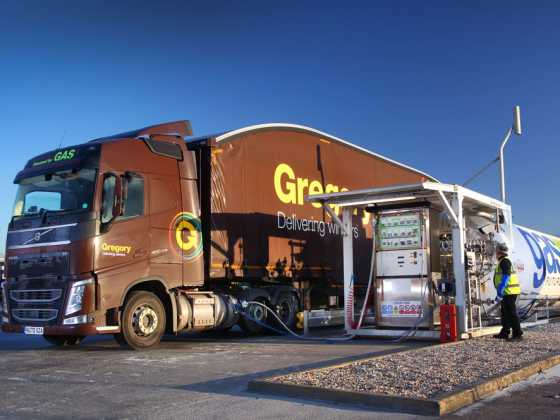The Volkswagen emissions scandal: the undoing of diesel?
With its contribution to air quality already being questioned, the Volkswagen emissions testing scandal has once again thrust diesel into the environmental spotlight. GreenFleet investigates the VW fiasco and the impact it may have on the future of industry testing cycles and the fuel itself
 September 18 will be a day that goes down in automobile industry history for signalling what could be diesel’s turning point. Long considered a low-CO2, high fuel economy darling, its reputation suffered a blow when the US Environmental Protection Agency (EPA) announced that Volkswagen’s diesel cars had been ‘cheating’ emissions tests. It sent ripples through both the car and business worlds and damaged the German car maker’s reputation as a manufacturer of ‘environmentally-friendly’ vehicles.
September 18 will be a day that goes down in automobile industry history for signalling what could be diesel’s turning point. Long considered a low-CO2, high fuel economy darling, its reputation suffered a blow when the US Environmental Protection Agency (EPA) announced that Volkswagen’s diesel cars had been ‘cheating’ emissions tests. It sent ripples through both the car and business worlds and damaged the German car maker’s reputation as a manufacturer of ‘environmentally-friendly’ vehicles.
‘Defeat device’
The EPA stated that a so-called ‘defeat device’ – actually a piece of software – enabled the car’s electronic control module to sense when it is being tested on a laboratory rolling road and recalibrate the engine to reduce and minimise the amount of nitrogen oxide (NOx) it put out, and thus pass the test. It did this by monitoring speed and steering changes, which are rare in such tests, and the length of the test drive itself.
When the tests were repeated in the real‑word, a ‘road calibration’ setting reduced the emission control system’s effectiveness, and the EPA recorded increased NOx levels, which exceeded US limits by between 10 and 40 times.
The International Council for Clean Transportation (ICCT) and West Virginia University first picked up on a potential issue in early 2014, when it found that a selection of diesel engines emitted substantially higher NOx emissions on regular roads than they did in the lab. The results were further analysed by the California Air Resources Board (CARB) and the EPA and, in December 2014, Volkswagen rolled out a software patch, which fixed the problem but didn’t provide sufficient answers to satisfy the authorities, which looked set to withhold conformity certificates for VW’s 2016 model-year vehicles until the reason for the earlier cars’ emission discrepancies was known. Without the certificates the cars couldn’t be sold, and VW had little choice but to admit that it had been using the ‘defeat device’ to falsify the EPA tests. European models also had the software fitted.
11 million cars affected
Over 11 million cars from the Volkswagen Group are said to be affected by the ‘defeat device’ issue, all of which feature a Euro 5 (EU5) compliant diesel-powered engine. Both 1.6-litre and 2.0-litre units from the ‘EA 189’ engine family, as well as 1.2‑litre ‘EA 111’ TDIs have been blacklisted. All affected vehicles were built between 2009 and 2015, and in the UK, around 1.2 million cars are set to be recalled. Close to 30 individual models have been caught up in the scandal, from VW Polos to Audi A6s – and that’s without taking into account the various individual engine outputs within each model range.
Volkswagen has issued a recall action plan, and hopes to have all remedial work completed by the close of 2016. It has sent letters to affected owners and set up self‑checking websites, which allow drivers to see if their car is afflicted by the issue.
Germany’s Federal Motor Transport Authority (KBA) has issued a mandatory recall; in the UK, the Department of Transport has confirmed a voluntary recall and considers the issue “VW’s problem”. Some cars will only require a software fix, while others (1.6-litre models in particular of which there are 400,000 in the UK) may need more substantial hardware upgrades. Volkswagen has gone to considerable lengths to point out that cars fitted with the ‘EA 288’ family of engines from 2012 are not affected by the issue, and that all cars fitted with the EA 189 and EA 111 diesel engines are “technically safe and roadworthy”.
Increased NOx levels
“Technically safe and roadworthy” they may be, but environmental organisations have been quick to point out the dangers of increased NOx levels, which are proven to be harmful and cause breathing problems – including airway inflammation, lung capability reduction and asthma-related issues. An Environmental Audit Committee report published on 26 November 2014 blamed road traffic for 46 per cent of nitrogen oxides (GreenFleet, issue 81), while a Public Health England report, also published last year, estimated that 29,000 deaths were a result of air pollution, around 25 per cent of which could be attributed to transport emissions alone.
Diesel engines take a lot of the blame. A vehicle excise duty tax system introduced by Tony Blair’s Labour administration favoured low CO2-emitting vehicles, which particularly favoured diesels as they emit less carbon dioxide than their petrol counterparts. Naturally, we saw an upturn in diesel car sales as retail and fleet customers alike clamoured to reap the benefits of low tax rates and high fuel economy returns. Now widely seen as misinformed and a poor decision on environmental grounds, it means millions of drivers were encouraged to switch to diesel for the sake of the planet without considering the hidden dangers of massively increased NOx levels. According to vehicle emissions data service Emissions Analytics, low average speed stop-start driving (such as the type most frequently seen in cities) has been reported to “dramatically increase” the levels of NOx emissions.
“Serious questions”
HMRC figures obtained by Sewells Research and Insight show that 81 per cent of the UK’s fleet of 2.1 million company cars currently run on diesel, with “great importance” having been placed on CO2 emission figures. More pressingly, a total of 64 per cent of buyers were said to consider NOx emissions when adding new cars to fleet choice lists. Indicating a huge loss of confidence, over half of operators who have Volkswagen Group cars on their fleets claimed they were reviewing that position. In the wider picture, more than half of respondents said that they were less likely to trust claims made by car manufacturers in the future.
Simon Staplehurst, Commercial Research Manager at Sewells, said: “Fleet operators have a right to ask serious questions of manufacturers when news like this emerges. It’s hard to exaggerate just how important fleets are to manufacturers and how important diesel is to this market. Fleet managers make critical business purchasing decisions on manufacturer claims when it comes to fleets and trust is the bedrock of these relationships and choices.”
Great deal cleaner
Since the gradual adoption of current Euro 6 (EU6) emission standards, diesel engines have become a great deal cleaner. New cars sold from 1 September 2015 must comply to the standard, while light commercial vehicles have until 1 September 2016 to get in line.
Volkswagen has withdrawn 4,000 units of affected EU5 stock from sale and most of the cars it and its group companies market in the UK and Europe are now EU6-compatible.
In order to pass the Euro 6 emission standard, a diesel car must not emit less than 80mg/km of NOx – a 55 per cent reduction from Euro 5 standards – and no more than 5mg/km of particulate matter. Since September 2014, petrol engines have had a 60mg/km limit on NOx emissions (GreenFleet issue 86).
At the time of writing, it is still unclear whether other manufacturers besides Volkswagen are using similar tricks to pass ever-stricter emissions tests in the US and Europe but many, such as BMW, Mercedes-Benz and PSA Peugeot Citroën have denied doing so. The EPA widened its testing regime to include other manufacturers four days after Volkswagen’s exposure in an effort to ascertain whether it was an industry-wide issue.
The NEDC European testing system had itself been called into question before the Volkswagen story broke. Long seen as outdated, the 6.8-mile rolling road test was introduced in the 1970s, and manufacturers are permitted to remove exterior protuberances, tape up gaps and use special lubricants used to help pre-production vehicles achieve the necessary standard.
Greg Archer, Clean Vehicles Manager of the Transport & Environment campaign group believes emissions cheating will turn out to be an industry-wide practice: “Volkswagen’s admission of cheating is just the tip of the iceberg and there will be a lot more companies embroiled in this. Tens of millions of cars have been sold since 2009, and with exactly the same technology being used in Europe as in the US, this will not be an isolated case.
“The current EU test is simply not fit for purpose. In the US authorities undertake conformity checks on 10-15 per cent of models coming off production lines where as in Europe the tests are performed on vehicles specially prepared by the car makers and usually conducted in their own labs. What’s more, in Europe the testing companies are paid by the car makers and overseen by national type approval authorities whose costs are also met by the car manufacturers. Europe needs to end the system where car makers can effectively ‘shop around’ different countries for approval. We need an independent EU Type Approval Authority, funded by a levy of €20 on every vehicle sold.”
However, the Society of Motor Manufacturers and Traders (SMMT) has also published a report in recent weeks which showed that modern diesels are up to 21 per cent cleaner than those from 2003. In contrast to Archer’s comments, it also issued a statement on the Volkswagen scandal that there was, “no evidence to suggest that any other company is involved, let alone that this is an industry-wide issue. Consumers should be reassured that cars sold in the UK must comply with strict European laws. All cars must complete a standard emissions test, which, unlike in the US, is … witnessed by a government-appointed independent agency. On the separate on-going debate about real world testing, industry accepts that the current test method for cars is out of date and is seeking agreement from the European Commission for a new emissions test that embraces new testing technologies and which is more representative of on-road conditions.”
New testing regime
A new European Real Driving Emissions (RDE) testing regime, which claims to be more representative to real-world conditions, is set to arrive in 2017 – more than 10 years after it was first mooted. Reported delays mean that this stricter test may not actually become law until 2020 and car manufacturers have put forward the case that diesel engines are costing them more to pass the ever‑stricter tests. This may be one reason why Volkswagen used a ‘defeat device’ in its cars: selective catalytic reduction systems which inject solution into the catalyst to convert NOx into nitrogen, water and carbon dioxide are costly when added to every individual car.
The European Automobile Manufacturers’ Association (ACEA) has reported on European Commission proposals for a number essential elements needed for the upcoming RDE legislation. It says that the motor industry agrees with the need for emissions to more closely reflect real-world conditions but stresses the need for a timeline and testing conditions that will take into account both the technical and economic realities of the change and allow a reasonable transition time to apply RDE to all new vehicles.
“We are fully aligned with the need to better measure the emissions of nitrogen oxides (NOx) from diesel cars and vans under normal driving conditions,” commented Erik Jonnaert, ACEA Secretary General. “However, it is important to proceed in a way which allows manufacturers to plan and implement the necessary changes, without jeopardising the role of diesel as one of the key pillars for fulfilling future CO2 targets.”
The ACEA argues that without realistic timeframes and conditions, selected diesel vehicles may become unaffordable, forcing manufacturers to withdraw them from sale. It says that this could have repercussions upon consumer choice as well as employment in the wider automotive sector and that the knock-on effect will also hit light commercial vehicles, where diesel is the favoured technology for many operators.
Jonnaert continued: “Our industry is committed to contributing constructively to the efforts of the Commission and member states to upgrade emissions testing. Clarity and predictability will enable manufacturers to continue investing in technologies that meet even higher standards and contribute to the fight against climate change.”
No higher VED charges
In the UK, Transport Secretary Patrick McLoughlin has stated that drivers who bought Volkswagen Group cars affected by the emissions issue will not incur higher Vehicle Excise Duty if their vehicle is found to be ‘defeat device’-equipped. The government is reported to be investigating the wider issue and the Department for Transport (DfT) has written to manufacturers informing them of new laboratory and real-world testing by the Vehicle Certification Agency which will ascertain how industry wide the issue may spread.
In McLoughlin’s words, “Our priority is to protect the public and give them full confidence in diesel tests. The government expects VW to support owners of these vehicles already purchased in the UK and we are playing our part by ensuring no one will end up with higher tax costs as a result of this scandal. We are also starting our testing programme to get to the bottom of what the situation is for Volkswagen cars in the UK and I have been pressing for action at an EU-level to improve emissions tests.
“I have also called for a Europe-wide investigation into the use of ‘defeat devices’. The DfT will work closely with VCA and the Driver and Vehicle Standards Agency (DVSA) to carry out a programme of tests. Neither cars nor the testing facilities will be provided by the vehicle industry themselves. The next phase of the programme will involve initially re-testing diesel cars that the VW Group has confirmed contain ‘defeat device’ software of Euro 5 category, approved by the VCA, in both a laboratory and real-world setting and the government is liaising with other EU countries’ approval authorities who are currently conducting similar investigations.”
Huw Irranca-Davies MP, Chair of the Environmental Audit Committee (EAC) also commented on the issue and called for more UK government support for accurate tests:
“I support the government’s call for complete transparency across the EU automotive industry and a thorough investigation into this scandal is needed. In the light of the revelations over VW in the US, customers need urgent reassurance that they have not been deceived by VW or other manufacturers. Air pollution from emissions in diesel vehicles is linked to thousands of deaths in the UK each year. We need to know from our government that the reported vehicle emissions in the UK are accurate, that no deception has taken place, and that our emissions-testing regime is rigorous. This will also add weight to the calls by the previous EAC committee to clean up the poor air quality in our city centres by introducing a network of low emission zones.”
Demonisation of diesel
The demonisation of diesel has gathered pace in recent months and the Volkswagen emissions issue will do nothing to temper the flames of the anti-diesel fire. Many cities have campaigned for urgent action on cutting diesel emissions and France is potentially taking that action one step further by phasing out tax breaks for diesel cars by 2020. Paris is said to have a plan in place to ban diesel engines by the same deadline, thanks to poor air quality concerns. Over 50 per cent of cars sold in Europe have diesel engines, so the seismic shift back to lower NOx petrol equivalents or to low-emission solutions such as hybrid and electric vehicle technology won’t be immediate.
In the immediate aftermath of the VW scandal breaking, diesel sales were still holding up, and even Volkswagen diesel vehicle sales were showing no signs of slowing down. Timing could be an issue here, though, with some sales recorded pre-scandal.
GreenFleet says…
With testing legislation as hazy as some of the smoke being pumped out by older diesel vehicles every day, the new emission evaluation cycles can’t come soon enough. Even though the dust may be settling at the time of going to press, the wider impact of the Volkswagen emissions scandal on diesel cars, the motor industry, and the fuel itself could be felt for many years to come. It may no longer be the fairytale it once was, but the whole diesel story has not quite been told yet.
Further Information
European emissions standards






